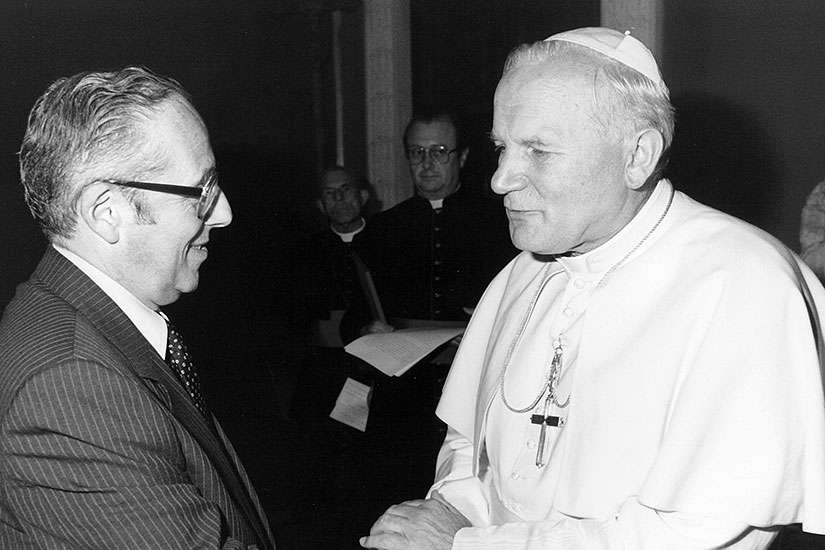He was also the first Jewish minister in a Quebec government and became a "unifying force" through life-long advocacy of toleration and respect between the English and French and between the Jewish and non-Jewish communities of Quebec.
Dr. Goldbloom died in Montreal Feb. 14 at the age of 92. His packed funeral on Feb. 18 was attended by Montreal's political and religious elite, including Montreal Archbishop Christian Lepine.
Lepine called Dr. Goldbloom "a man of dialogue" who had "genuine" encounters with people of all backgrounds.
“With a serene awareness of his own Jewish faith, but with his heart and mind open to all, he dedicated his life to improving the encounter between Christians and Jews,” said Lepine.
In 2012 Dr. Goldbloom was invested by Pope Benedict XIV as a knight in the Pontifical Equestrian Order of St. Sylvester, one of the few Jews worldwide so honoured by the Vatican in recognition of his work in advancing Catholic-Jewish dialogue over almost six decades.
His interest in resolving the historic strained relationship between Christians and Jews began in the 1950s when he was invited by the Jesuits to be part of a dialogue at Loyola College.
“It was an intellectually stimulating exercise, calling upon all that I learned about Judaism and obliging me to learn a great deal more,” he wrote in his memoirs, Building Bridges.
Over the years Dr. Goldbloom became friend and confidante of at least four cardinals — Paul-Emile Leger, Paul Gregoire, Gerald Emmett Carter and Jean-Claude Turcotte — with whom he worked to establish a meaningful dialogue between the two religions. He once did an hour-long television program with Turcotte about the leadership of Pope Pius XII during the Second World War.
Flags at Montreal's city hall were lowered in mourning as representatives of more than a dozen religious communities, elected officials of all political stripes — including NDP leader Thomas Mulcair — and mourners filled the 1,200-seat Temple Emmanu-el Beth Sholom, a reform Synagogue in Westmount. In her eulogy Rabbi Lisa Grusheow remembered Dr. Goldbloom as a great man, a man who set the bar exceedingly high. He was, she said, someone who would stand his ground but who had great respect for others and a measured judgment which allowed him to get things done.
Dr. Goldbloom, a doctor’s son who became a pediatrician, was born in Montreal on July 21, 1923. He had a patrician private school education and obtained his medical degree from McGill University in 1945. His political career began in 1965 when he sought the Liberal nomination for the federal constituency of Mount Royal but lost to Pierre Elliott Trudeau. He was elected a member of Quebec's National Assembly the following year. When the Liberals took office in 1970, Premier Robert Bourassa appointed him to the Quebec cabinet, the first Jew to hold a cabinet portfolio in the province.
Although he later distinguished himself as Minister of Municipal Affairs, it was as Quebec’s first environment minister that Dr. Goldbloom insisted he made the greatest contribution to public service as “a pioneer of environmental protection.”
He quit politics in 1979 to become head of the Canadian and then the International Council of Christians and Jews. In 1991 he was named Commissioner of Official Languages.
Affectionately known within his family as “Papa Doc,” his children and grandchildren spoke of someone who was always engaged and engaging. He had a photographic memory, was able to do French crossword puzzles in English, played the piano, had a fine tenor voice and could sing Italian arias and loved the theatre. (He once acted on stage in a production of Romeo and Juliet with Christopher Plummer.)
In his memoirs published last year, Dr. Goldbloom wrote that in spite of historic differences Catholics and Jews “have come a very long way since World War II."
"The greatest progress has been in the reciprocal and mutual respect between Christians and Jews. We are looking at our shared history and understanding it differently and more positively from the way we did for two millennia. I believe — and I hope that I am right — that this change is irreversible.”


